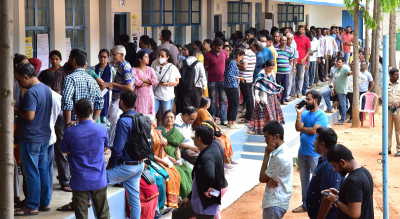Share

NEW DELHI — Announcing the dates for the Lok Sabha elections here on Saturday, the Chief Election Commissioner (CEC), Rajiv Kumar, said an elaborate security arrangement has been put in place to look after the overall safety of the entire election process.
To hold the elections peacefully, the Election Commission of India (ECI) has ensured that the security agencies deal effectively with four ‘M’s -- Muscle, Money, Misinformation, and MCC (Model Code of Conduct) violations.
The CEC said the Central Armed Police Forces (CAPF) have been deployed to supplement the local police force in ensuring a peaceful and conducive atmosphere for the smooth conduct of the elections in a free, fair, and credible manner.
Based on the assessment of the ground situation, CAPF and State Armed Police (SAP) will be deployed during the elections.
"The CAPF shall be deployed well in advance for area domination, route marches in vulnerable pockets, point patrolling, and other confidence-building measures to reassure and build faith in the minds of the voters, especially those belonging to the weaker sections, minorities, etc.,” Kumar said.
The CAPF/SAP shall also be deployed in the 'expenditure sensitive constituencies' and other vulnerable areas and critical polling stations as per the assessment of the ground realities by the CEOs of all states/UTs in consultation with the various stakeholders.
“Besides, these forces will secure the strong rooms where the EVMs and VVPATs will be stored, besides securing the counting centres, as required,” Kumar said.
To ensure optimum and effective utilisation of the state police and the CAPF, the ECI has also directed to form a committee consisting of the CEO (chief electoral officer), State Police Nodal Officer (SPNO), and the state CAPF coordinator to jointly decide the State Deployment Plan and to ensure the randomisation of state police.
Kumar also said that comprehensive instructions have been issued to deal with illegal cash flow, including deployment of expenditure observers, flying squads, static surveillance teams, video surveillance teams, accounting teams, media certification & monitoring committees, etc.
The state excise departments have been asked to monitor the production, distribution, sale, and storage of liquor and inducements in the form of free items during the election process.
Also, the Income Tax Department has been asked to activate its air intelligence units (AIUs) at the airports, gather intelligence, and take necessary action to check the movement of large sums of money in all the states and Union Territories.
The Bureau of Civil Aviation has also been directed to check chartered planes and helicopters at the commercial airports.
“Control rooms and complaint monitoring centres with 24-hour toll-free numbers shall be operative during the entire election process in every district, which will be headed by a senior police officer,” the CEC said while elaborating the plans to deal with misinformation.
“Social media will be monitored and strict action will be taken against rumour-mongering,” he added.
On the Model Code of Conduct (MCC), Kumar said all the provisions of the MCC will apply to all the states/UTs with regard to all the candidates, political parties, and the government of the respective states.
“The Commission has made elaborate arrangements for ensuring the effective implementation of the MCC guidelines. Any violation of these guidelines will be strictly dealt with. The Commission re-emphasises that the instructions issued in this regard from time to time should be read and understood by all the political parties, contesting candidates, and their agents/representatives to avoid any misgivings or lack of information or inadequate understanding/interpretation,” Kumar said.
"The governments of all the states/UTs have also been directed to ensure that no misuse of official machinery/position is done during the MCC period,” he added.